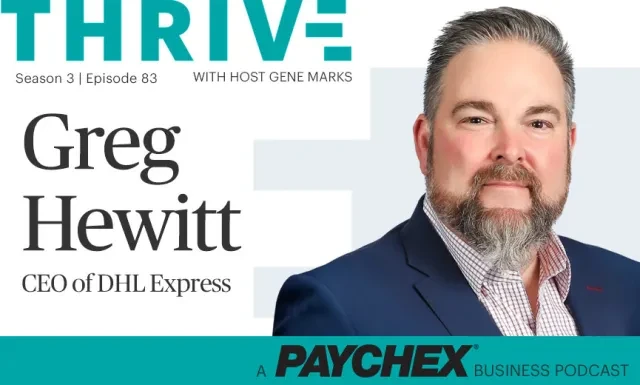Se buscan: habilidades, no títulos, inteligencia artificial para atención al cliente, ayuda con el seguro médico

Podcast •

Vea
Resumen
Employers in a recent survey – 33% of them – said they no longer require a bachelor’s degree for some roles, even as high as senior-level positions. What does your business gain? More applicants and possibly those with the perfect skill sets. Also widening is the practice of using AI technology on customer service tasks. Gene comments on pros and cons, and also lets businesses know that a 10% rate hike for health insurance is going to require some preparation and planning. Listen to the podcast.
Ver transcripción
Hey, everybody, it’s Gene Marks and welcome to this week's episode of the Paychex THRIVE Week in Review podcast. This is where we take a few items of news that impacts your business and mine, and we talk about them a little bit, so we're up to speed on what's going on and hopefully making good decisions based on the world around us. So, let's go to the news.
The first bit of news comes from bizjournals.com. American City Business Journals had a very interesting report on a survey that came out about job applications. So, let me share with you. According to a new survey from intelligent.com, 33% of business leaders said their company eliminated a bachelor's degree requirement in the hiring process this year.
I'll read more. Experts say the shift shows a broader recognition of the importance of practical skills and real-world work experience can be more important measures for potential success than four years of formal college education in many job functions. Among the organizations that have removed the degree requirement, 59% of them have done so for entry-level jobs. 54% have done it for mid-level roles, and 18% have done it for senior-level positions.
So, what does that mean for you and me? It means that when we're looking for job applicants, obviously it depends on the job and depends on, you know, the skill level that you're looking for, but more and more employers – a third of employers per this survey – are really kind of stepping over or not using a bachelor's degree from a college as a requirement for applying for a job.
It's also been reported in the news of some larger companies like Microsoft and Google and Amazon are doing the same, as well. Skills are what's most important. So, for those of you that are potentially in college or going to college listening or watching this, you know, getting an English or history degree is great. It kind of depends on the job you're going to apply for afterwards. If you're going to apply for an accounting job or an engineering job or something like that, it may sort of get in the way.
For employers though, we shouldn't be putting as much emphasis on college degrees, depending on the job, as we've been doing in the past. People don't need to have a college degree to prove that they're smart. And I know many, many super smart people that have gone to community college, two-year colleges, not colleges at all, but they have special skill sets, whether it's in finance or computer programming or contracting or what have you.
So, to say, you know, there is a growing trend of employers that are avoiding college degrees and hiring people without them because the skills make more sense to them than just having a college degree.
Brings me to my next bit of news. This comes from Capterra.com. It's reported on Yahoo!Finance and it has to do with AI. Apparently, according to a new survey, 61% of people that are using – companies using – AI software to see that it is positively impacting their customers overall. The top three benefits of AI-enabled customer service include faster response times, cost savings. and improved customer satisfaction.
The top three challenges, however, include maintaining customer trust, ensuring accurate information, and alienating customers. And I want to read you this quote from a woman named Laura Burgess. She's a senior analyst at Capterra. By the way, Capterra is a firm that helps select software for business.
“Implementing AI and customer service operations requires a well thought out strategy to ensure a smooth transition and maximize benefits. Business decision-makers need to consider implementing steps to balance AI and human agents effectively to grow their business and keep customers.
So, let me talk to you a little bit about this one. When I am looking at all of my clients – I cover AI and technology for Forbes. I write about it six or seven times a month. I am seeing AI being used of any place in customer service. Big corporations are investing heavily in AI chat bots for customer service. Go to a hotel, call up a large corporation for help, and you might very well be assigned to a robot that is trying to help you, you know, answer questions.
Now, obviously there are drawbacks to this approach, and the drawbacks are: We do sense we're talking to a robot and that's not good because people do like human interactions, and another drawback is just accuracy. You want to make sure that, you know, agents are actually doing the right thing.
But I'm telling you right now, big corporations right now are investing heavily – billions of dollars – in AI technology, mainly for right now, customer service. Now, that doesn't mean that there is going to be way more used to be AI in the future for robotics, for fintech, for payment, for, you know, for sales automation, for accounting. I get all that.
But in 2024, I'm seeing the money go towards customers service and I'm seeing big corporations use it. Now, how does it affect us as business owners? Well, we're not investing millions or billions of dollars in technology, but the software companies that we use are doing just that. So, you think we should be talking to the software companies we use for our customer service software? I mean Salesforce.com, Microsoft Dynamics, Zoho, HubSpot, any of these – Zendesk – any of these applications that are out there.
These platforms that not only provide sales automation software, but customer service capabilities. Those companies and many more are investing heavily in AI technology to create chat bots and automation and get answers to your customers faster and more accurately than even if a human is doing it.
That technology is starting to become real. For a lot of businesses. So, my advice to you is you don’t have to invest billions of dollars doing this, but you should be talking to your software vendors because they're doing this right now. And again, customer service is their main focus this year.
The final story that I have to share with you, it actually comes from Repair Driven News. It's for the automotive and repair, you know, equipment repair industry. But they're actually reporting on a Wall Street Journal report which came out just this week, as well, and it's about health insurance.
And brace yourself: Your health insurance rates, just like mine, are likely to increase about 10% or more this year. According to the Wall Street Journal, roughly half of small-business owners said their health insurance costs increased by 10% or more already this year.
This is a survey of about 800 business owners that was conducted in June. Nearly one in 10 reported increases your idea of 25% or more in health insurance. The article cites recent research from JPMorgan Chase, which covered healthcare expenses, made up nearly 12% of payroll expenses for firms less than $600,000 in revenue, compared to 7% for businesses with revenue greater than $2.4 million.
So that study, the JPMorgan Chase study, looked at about 9100 small business health insurance programs. So, what does that mean? It means that our health insurance rates, if you haven't seen it already, continue to go up well past the rates of inflation; on average, about 10%. Last year was about 8%, on average, if I remember correctly. But this year it's even higher.
Having said that, health insurance is one of the top three benefits that we all need to make sure that we are providing, right? Health insurance, retirement … flexibility has become the third top benefit. So, as a business, we have to figure out ways to provide health insurance affordably, but also to stay competitive.
We have a lot of clients that are sharing more and more of the health costs with their employees by having, you know, less of a contribution to employees health. That's certain. Some people are going into captive insurance programs for self-insuring. Some people are using PEO (Professional Employer Organizations), which in some cases consolidate a bunch of employees and negotiate better rates. Some of my clients are getting their health insurance through business association, like the Chamber of Commerce or even their own industry associations, because now association health plans are allowed, and a lot of associations are getting into that game.
So, there are options, and it needs to be investigated and investigated closely because health insurance itself is a huge cost, but it's a necessary cost for a business. And now, as you're reading this or if you're watching this, you know, listening to this, you know: We're into August already, you need to be starting about 2025 and thinking hard about your health insurance costs because they're eating up a bigger and bigger part of your payroll. And it's going to happen, you know, increase even more in 2025. So, be prepared.
You've been watching and listening to this week's episode of the Week in Review, a Paycheck THRIVE podcast. If you need any tips or advice or help in running your business, by all means, sign up for our newsletter. It's paychex.com/thrive.
My name is Gene Maks. Thanks for watching and listening. We will see you again next week with a few more items of news that impacts you and me, and we'll talk a little bit about it then. Take care.
This podcast is property of Paychex, Inc. 2024. All rights reserved.

 Apple Podcast
Apple Podcast Spotify
Spotify iHeartRadio
iHeartRadio







